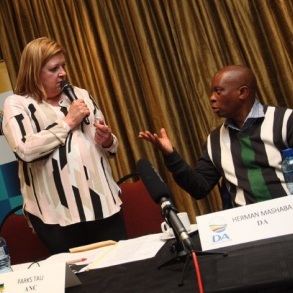
Lifestyle/Community

Four parties put best foot forward in election debate
OWN CORRESPONDENT
PHOTOGRAPHS: ILAN OSSENDRYVER
Pictured:ANC Councillor and Member of the Johannesburg Mayoral Committee Ros Greeff and Herman Mashaba, DA mayoral candidate for Johannesburg, at the election debate arranged by the SA Jewish Board of Deputies
The debate, adroitly moderated by well-known radio journalist and author Mandy Wiener, was held under the auspices of the SA Jewish Board of Deputies as part of its “Make Us Count” election awareness and educational campaign.
The four panelists were long-serving ANC counsellor and Member of the Mayoral Committee Ros Greeff (standing in for Johannesburg Mayor Parks Tau, who was unable to attend), DA mayoral candidate Herman Mashaba, Cope President Mosiuoa Lekota and the ACDP’s Steven Swart. The EFF was invited to participate, but declined to do so.
SAJBD Gauteng Council Chairman Shaun Zagnoev gave the welcome and introduction to the evening.
The lively discussion, while sometimes robust, was conducted in a generally good-humoured and constructive spirit.
Greeff put much stress on what she asserted was an excellent track record on the mayor’s part as a reason for voting ANC, citing as examples the financial stability achieved for the city and the boom in construction and new infrastructure that was evident for all to see.
With reference to the Tshwane unrest, she nevertheless conceded that the party’s National Executive Committee would have to engage in “honest self-examination” after the election in order to address how best to manage the selection process for party candidates in future.
For his part, Mashaba pledged an administration that would he run on thoroughly professional lines, with scrupulous accountability in all public spending and focused programmes to improve services, curb crime and create more jobs.
While acknowledging that racism remained a problem, he deplored what he saw as being a deliberate ploy by the ANC to put exaggerated emphasis on this in order to cover up its own failings, as well as to falsely portray the Democratic Alliance as being the “white man’s party”.
Lekota called for a shift to take place from the current top down mode of governance to one giving wider powers to communities to choose their own leaders and become more involved in grass-roots decision making.
Swart stressed that South Africa, certainly at the local level, was clearly moving into a new era of government by coalition, a scenario in which smaller parties like his own could play a crucial king-maker role.
The ACDP had in fact already done so in the Western Cape and it continued to be an influential presence in the province. Swart further emphasised the ACDP’s commitment to upholding traditional Judeo-Christian values, without which the social and moral challenges facing the country would never be effectively dealt with.
“In implementing programmes like ‘Make Us Count’, the Board aims to encourage the Jewish community to identify with and participate in their country’s culture of political democracy. We are very grateful to our four panelists for giving of their time to assist us in realising these goals,” Zagnoev said.
He gave an overview of the SAJBD’s “Make Us Count” campaign, which had first been run, with much success, for the 2014 national elections. To date, it had included a registration drive to encourage the Jewish community to ensure that they were registered to vote and the putting together of a multi-faith and multi-national election observer team to assist the Independent Election Commission on voting day.




